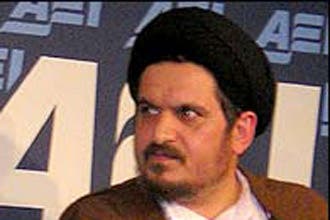Khomeini’s grandson slams stoning of adulterers
Scholar accuses him of irresponsibility
Stirring a bitter debate and drawing a scathing attack, the grandson of the spiritual leader of Iran’s 1979 Islamic revolution has branded the stoning penalty of adulterers to be against Shiite Islam.
With 11 men and women awaiting their death by stoning in public in Iran, human rights organizations have been issuing warnings against the implementation of the sentence and the controversy reached its peak in the Islamic republic.
Hussein Khomeini, grandson of Ruhollah Musawi Khomeini, lashed out at the penalty and called for annulling it. But renowned Shiite scholar Mohamed Taskhiri called Khomeini's statements "irresponsible" and stressed that stoning as a punishment is indisputable in all Islamic denominations.
From his house in the city of Qom, Khomeini told AlArabiya.net that according to moderate scholars, the person who has the authority to impose such penalties should be someone as "inerrant" as the prophet, and this does not apply to anyone nowadays. He pointed out that this penalty was sporadically applied before the revolution, but came to be a law after Iran became an Islamic republic.
An organization that calls itself “Stop Stoning Forever” is launching a nationwide campaign to annul the penalty while Amnesty International expressed concern over the fate of 9 women and 2 men waiting to be stoned.
The human rights body, which regards the penalty as inhumane, pointed out to the part of the law that stipulates using big stones to cause maximum pain, but not kill the victim on the spot.
Islamic punishment
On the other hand, head of the World Forum for Proximity of Islamic Schools of Thought Sheikh Mohamed al-Taskhiri slammed human rights organizations’ reports as inaccurate and refuted allegations of the frequency with which fornication penalties are carried out.
"Stoning was only done once or twice since the time of the revolution. It is difficult to prove the occurrence of adultery because, according to Islamic law, this requires four witnesses and the culprit never confesses anyway. But all Islamic schools of thought support the Hudud [punishment for serious crimes], and I am for applying them" Taskhiri told AlArabiya.net.
Taskhiri called Khomeini's statements "irresponsible" and stated that he has been against the Islamic Revolution from the beginning.
As for stoning in other Muslim countries, Taskhiri commented that some extremist governments have just been applying it unwisely: "In Iran, if the judge makes a mistake, the ruling could still be contested by the Supreme Judiciary Council."
(Translated from Arabic by Sonia Farid)
